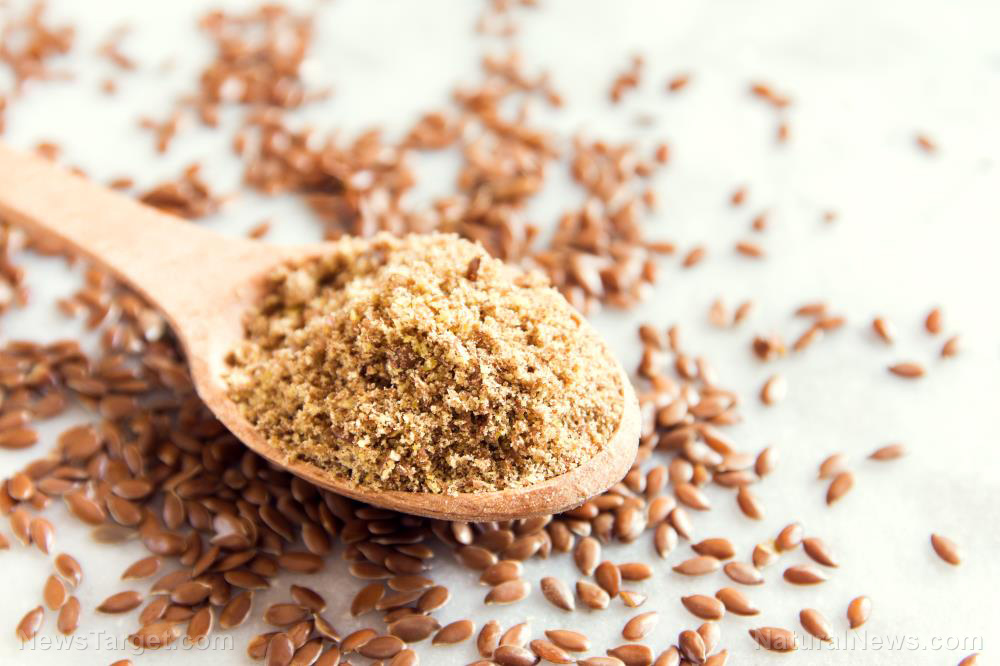Flaxseeds can help you lose weight and improve your gut health
06/21/2019 / By Vicki Batts

Flaxseed are one of nature’s many superfoods. Like other nuts and seeds, flax is loaded with vitamins, minerals, fatty acids and phytonutrients. It’s not a secret that flax is good for you, but science continues to find new ways to harness the powerful healing benefits of this “super seed.” New research shows that flaxseed can help improve gut health by fostering good gut bacteria — and it can help promote weight loss.
Like other naturally beneficial, healing foods, flaxseed has been subject to plenty of scrutiny over the years. Naysayers from the “conventional”medicine community are always quick to dismiss the power of good nutrition and insist that there is no way to prevent or treat disease with food.
Food is what supplies our bodies with the nutrients needed to survive. It makes perfect sense that a nutritionally bereft diet comprised mostly of processed junk leads to disease. And yet, daring to even talk about the benefits of the humble flaxseed is practically a crime these days.
Flax for weight loss and gut health
New research published in the American Journal of Physiology—Endocrinology and Metabolism finds that flaxseed can illicit positive changes in gut bacteria populations, also called “microbiota.” These changes are so significant that they can affect metabolic health — and potentially, prevent diet-induced obesity.
As The American Physiology Society explains, the good bacteria that live in your gut play a significant role in weight management and glucose tolerance (the way your body processes sugar).
How can flaxseed benefit gut bacteria? When fiber is broken down, or fermented, in the gut, amazing things can happen. Fermentation of fiber can “produce favorable changes in the digestive system, such as an increase in beneficial fatty acids, which may reduce the production of fat tissue in the body and improve immune function.”
To learn more about flaxseed’s benefits, scientists studied its effects in mice. For the study, the researchers fed the mice four different diets:
- High fat group: A high-fat diet that contained no fiber.
- Cellulose group: A high-fat diet that contained 10 percent indigestible cellulose fiber.
- Flaxseed group: A high-fat diet that contained 10 percent flaxseed fiber.
- Control group: A standard diet that contained 4.6 percent soy-based fiber.
Across the board, the flaxseed-fed mice reeled in the most health benefits. While the cellulose and flaxseed groups boasted similarly healthy populations of good gut bacteria, the flaxseed-fed mice were “more physically active” and had less weight gain on the high-fat diet than all other mice cohorts.
Feeling the benefits of flax
The evidence indicates that intestinal microorganism that feed on flax produce more beneficial fatty acids. So you aren’t just what you eat — you’re what your microbiome eats, too.
In their conclusion, the scientists state, “Our data suggest that flaxseed fiber supplementation affects host metabolism by increasing energy expenditure and reducing obesity as well as by improving glucose tolerance. Future research should be directed to understand relative contribution of the different microbes and delineate underlying mechanisms for how flaxseed fibers affect host metabolism.”
Past research has also shown that flaxseeds are good for weight loss. In addition to supporting good gut bacteria, the fiber in flaxseed is great for boosting satiety and sustaining fullness. Flax is also a great source of a class of plant nutrients known as lignans. Studies show that lignans are good for lowering blood pressure and can also assist in weight loss.
The omega 3 fatty acids found in flax also have a host of positive health effects — again, including weight loss support as a potential benefit. Flaxseed has much to offer the human body; some research even shows this little seed can fight the symptoms of menopause.
Learn more about what you’re eating at Food.news.
Sources for this article include:
Tagged Under: digestion, fiber, fight obesity, flax seeds, flaxseed, flaxseed fiber, flaxseed oil, food cures, food is medicine, functional food, gut bacteria, gut health, gut microbiome, gut microbiota, obese, obesity, prebiotic foods, slender, weight loss
RECENT NEWS & ARTICLES
COPYRIGHT © 2017 MENS FITNESS FOCUS


















